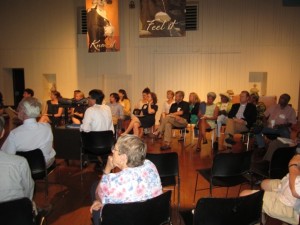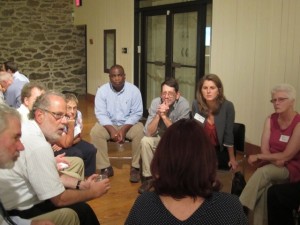Unfamiliar terrain: Reevaluating a landmark’s past (Part 2)
24 December 2012 – Joseph Cialdella
preservation, public engagement, community history, sense of place, museums, scholarship, profession
 To address the issue of how to make historic designation and documentation a part of Cliveden’s ongoing dialogue with its various publics, the site sponsored a forum themed around the question “Do National Historic Landmarks Represent Our Historic Values?” This event was an opportunity to bring together community members, museum professionals, and preservationists from the Germantown area to discuss the NHL process, our research for the nomination, and moreover the changing meaning of Cliveden’s history today, all while enlivening what can otherwise seem on the surface to be a closed and static process of filling out a bureaucratic form.
To address the issue of how to make historic designation and documentation a part of Cliveden’s ongoing dialogue with its various publics, the site sponsored a forum themed around the question “Do National Historic Landmarks Represent Our Historic Values?” This event was an opportunity to bring together community members, museum professionals, and preservationists from the Germantown area to discuss the NHL process, our research for the nomination, and moreover the changing meaning of Cliveden’s history today, all while enlivening what can otherwise seem on the surface to be a closed and static process of filling out a bureaucratic form.
 Since members of my group were all non-local participants (as is the case with many public history projects), we were not part of the long-standing dialogue between Cliveden and the Germantown neighborhood. Cliveden’s staff acted as a bridge between us, as experts in a particular process, and the audience of interested neighbors, and, importantly, many from nearby historic sites who are rarely in the same room together in this capacity. After brief presentations by Cliveden’s staff, historian Bill Bolger from the NPS, and our team, the chairs were rearranged to facilitate small group discussion, with members of our group spread out between the groups, rather than clustered together.
Since members of my group were all non-local participants (as is the case with many public history projects), we were not part of the long-standing dialogue between Cliveden and the Germantown neighborhood. Cliveden’s staff acted as a bridge between us, as experts in a particular process, and the audience of interested neighbors, and, importantly, many from nearby historic sites who are rarely in the same room together in this capacity. After brief presentations by Cliveden’s staff, historian Bill Bolger from the NPS, and our team, the chairs were rearranged to facilitate small group discussion, with members of our group spread out between the groups, rather than clustered together.
Opening up this project, rather than keeping it behind closed doors, was a way to provide a public program, as well as demystify the process of doing historical work. In this sense, the “arts of citizenship” meant not only using our expertise to write history for a public agency and historic site, but making sure that our writing, process, and ideas were legible so that staff, visitors, professionals, and local residents who experience and manage places like Cliveden on a daily basis could have a way in to co-create Cliveden’s renewed meanings.
Practicing the arts of citizenship meant that we needed to give as much attention to listening, observing, and learning from the context on the ground (whether from Cliveden’s preservation director or interested neighbors) as to the critical analytical work of assembling a coherent story, argument, and evidence for the nomination that would be accessible and useful to both Cliveden and the NPS. While it is sometimes difficult to be an outsider at an organization in the process of building community connections, our position as non-local professionals brought with it a certain critical distance. We added what we saw as a useful perspective into the mix by aiming to demonstrate how openly reevaluating the intangible work of written history required for designation can work in tandem with changing the seemingly steadfast image of history captured in Cliveden’s bricks and mortar.
The event was essential to our project, because the questions, concerns, and ideas presented at the conversation helped us to further clarify and refine the shape as well as the meaning of the ideas we put forward in the nomination as a part of the public record. Moreover, learning to listen and communicate between the needs of different people, organizations, and institutions is an important skill in a job market where almost everyone will have to move from one location to another, whether across town or across the country.
Conclusion
As historians trained in specific time periods and areas, we were challenged by this project to use and refine a more general set of skills and expertise, not just the content knowledge of our subfields, to a local context which was largely unknown to us. Practicing arts of citizenship outside of our home-place meant making the unfamiliar at least a little more familiar by collaborating with multiple stakeholders to understand the past, while also adding our expertise at using evidence to craft a narrative restating Cliveden’s significance in light of its deeper meanings today. It also meant serving the public through the cultural work of doing justice to multiple and contested pasts as a way of making the present a place of expanded meaning and greater understanding across the boundaries of institutions and places.
~ Joseph Cialdella is a PhD Candidate in the Department of American Culture & Museum Studies Program at the University of Michigan.
Read Part 1 of this post here.
Other blog posts about UMichigan’s role in the NHL process at Cliveden:
- “The long arm of Germantown,”
- “Reflections from the field: Cliveden conversations, National Historic Landmark edition“
- “A second look at a landmark’s history“
Images are courtesy of Cliveden of the National Trust.



